|
|
|
Sort Order |
|
|
|
Items / Page
|
|
|
|
|
|
|
| Srl | Item |
| 1 |
ID:
001497


|
|
|
|
|
| Publication |
Brighton, Academic Press, 1996.
|
| Description |
viii, 296p.hbk
|
| Standard Number |
1898723230
|
|
|
|
|
|
|
|
|
|
|
|
Copies: C:1/I:0,R:0,Q:0
Circulation
| Accession# | Call# | Current Location | Status | Policy | Location |
| 041023 | 956.04/STE 041023 | Main | On Shelf | General | |
|
|
|
|
| 2 |
ID:
159906
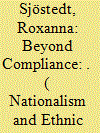

|
|
|
|
|
| Summary/Abstract |
Implementation of minority rights norms is an important step for integration. The ultimate aim of norm diffusion is internalization, that is, when a norm is being taken for granted. This article seeks to develop an understanding of socialization beyond formal compliance and suggests that material and ideational structures at both the elite and societal levels mutually reinforce one another. The framework is applied to the case of the integration of the Russian minority in Estonia, 1991–2016. The concepts of recognition and solidarity help to theorize and explain this socialization process and the constraints of both materialist and identity dimensions.
|
|
|
|
|
|
|
|
|
|
|
|
|
|
|
|
| 3 |
ID:
107985


|
|
|
|
|
| Publication |
2011.
|
| Summary/Abstract |
Exercises that encourage active and direct participation by students are often seen as a way to bridge the theory of classroom learning and the outside world. While most of the attention devoted to incorporating effective active learning strategies in the international relations classroom has focused on simulations, we argue that short field studies abroad, embedded in a regular course, are an excellent tool for bringing concepts and theories studied in class to life. We developed a course on minority rights and ethnic conflict that included a one-week field study in Ukraine. Through visits to international institutions and historic, strategic, and cultural sites, students see how theories of conflict management and human and minority rights are reflected in policy. The classroom program supports and reinforces student learning by preparing them to critically analyze information they encounter while abroad. The in-country experience supports and reinforces the formal learning on campus by making the theories and historical readings more meaningful. Through short-term field studies, we argue that students are able to grasp sophisticated theoretical arguments and make the connection between theory and policy, enriching their understanding of the world in which they live. Our experience has special relevance to teaching in international affairs, as we explore how to capitalize on short-term experiences abroad to deepen and broaden student learning about the world.
|
|
|
|
|
|
|
|
|
|
|
|
|
|
|
|
| 4 |
ID:
106221
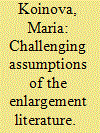

|
|
|
|
|
| Publication |
2011.
|
| Summary/Abstract |
This article argues that from the very start of the transition process in Macedonia, a fusion of concerns about security and democratisation locked local nationalist elites and international organisations intoa political dynamic that prioritised security over democratisation. This dynamic resulted in little progress in the implementation of human and minority rights until 2009, despite heavy EU involvement in Macedonia after the internal warfare of 2001. The effects of this informally institutionalised relationship have been overlooked by scholarship on EU enlargement towards Eastern Europe, which has made generalisations based on assumptions relevant to the democratisation of countries in Eastern Europe, but not the Western Balkans.
|
|
|
|
|
|
|
|
|
|
|
|
|
|
|
|
| 5 |
ID:
161208
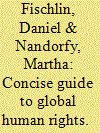

|
|
|
|
|
| Publication |
New Delhi, Oxford University Press, 2007.
|
| Description |
xix, 268p.: ill.,hbk
|
| Standard Number |
9780195689280
|
|
|
|
|
|
|
|
|
|
|
|
Copies: C:1/I:0,R:0,Q:0
Circulation
| Accession# | Call# | Current Location | Status | Policy | Location |
| 059506 | 323/FIS 059506 | Main | On Shelf | General | |
|
|
|
|
| 6 |
ID:
164909
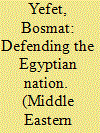

|
|
|
|
|
| Summary/Abstract |
This article discusses the Muslim discourse concerning the Coptic Christian minority since the 2000s in Egypt. Emphasizing the effects of the January 2011 uprising, the paper analyzes the role of nationalism and the national unity discourse in suppressing the debate regarding discrimination against the Copts. Despite the fissures that were created in the discourse, which rejects any reference to discrimination against the Copts, the Coptic issue remains trapped among the contested interpretations of national unity. All narratives of national unity and Egyptian essence, whether the official one pursued by the regime or the one promoted by pro-democracy activists, require the Copts to suppress their demand for rights for the sake of national unity. Adherence to the national unity discourse by all forces precludes the possibility of developing a form of nationalism or a national culture which embodies pluralism of identities and cultures and reinforces the role of nationalism as a tool for stifling pluralism and democracy for all Egyptians, whether Muslim majority or minorities.
|
|
|
|
|
|
|
|
|
|
|
|
|
|
|
|
| 7 |
ID:
072544
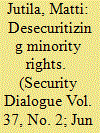

|
|
|
|
|
| Publication |
2006.
|
| Summary/Abstract |
The article discusses Paul Roe's argument that minority rights are always problems of (societal) security. According to Roe, a Huysmanstype deconstructivist strategy, which can be used in desecuritization of migration, is not possible in minority situations, because maintenance of a collective identity is central for minorities; therefore, the desecuritization of minority rights may be 'logically impossible' in certain cases. The present article focuses on Roe's arguments and attempts to find ways to avoid his determinism. It introduces a reconstructivist strategy for the desecuritization of minority rights, based on the process and discursive aspects of identity. It is possible for the stories of ethnically defined collective identities to be told in such a way that they do not exclude other such identities from the territory of a state. With this strategy, the author tries to show that desecuritization of minority rights is always logically possible, though in some cases it might be practically impossible in the foreseeable future.
|
|
|
|
|
|
|
|
|
|
|
|
|
|
|
|
| 8 |
ID:
140071
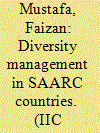

|
|
|
| 9 |
ID:
021868
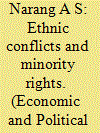

|
|
|
|
|
| Publication |
July 6, 2002.
|
| Description |
266-2701
|
|
|
|
|
|
|
|
|
|
|
|
|
|
|
|
| 10 |
ID:
113727


|
|
|
|
|
| Publication |
2012.
|
| Summary/Abstract |
Minority rights conditionality has been seen by scholars as a key part of the EU enlargement process. While the focus on minority rights has largely been discussed in terms of democracy and even human rights, this article argues that conditionality was a result of the securitization of minorities rather than part of an agenda to protect or empower. In this article, we look at the methods of desecuritization as factors of 'narratives, norms and nannies'. In response to Paul Roe's conclusions about the impossibility of desecuritizing societal security, we examine whether the EU, the Organization for Security and Co-operation in Europe (OSCE) and the Council of Europe have the ability to change the societal dynamics among ethnic groups in such a way as to make the desecuritization of societal security more likely. Overall, we illustrate how a focus on 'deconstructivist' and 'constructivist' approaches to societal security has failed to make European organizations important transformative actors in interethnic relations.
|
|
|
|
|
|
|
|
|
|
|
|
|
|
|
|
| 11 |
ID:
077313
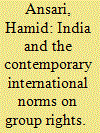

|
|
|
| 12 |
ID:
147706
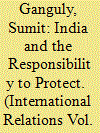

|
|
|
|
|
| Summary/Abstract |
India, though a working democracy, has adopted an ambivalent stance toward the genesis and evolution of the doctrine of the Responsibility to Protect. This article traces India’s views toward the earlier principle of humanitarian intervention, outlines its reactions toward the advent of the norm, and discusses India’s positions on the attempts to apply it to recent international crises. It then argues that India’s cautious support for the principle stems in part from concerns about its potential abuse in the hands of the great powers, post-colonial concerns about the diminution of the norm of state sovereignty, and finally, its own domestic vulnerabilities in the protection of human rights.
|
|
|
|
|
|
|
|
|
|
|
|
|
|
|
|
| 13 |
ID:
122446
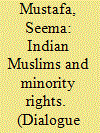

|
|
|
|
|
| Publication |
2013.
|
| Summary/Abstract |
Post 9/11, the West descended on India seeking answers to the one
question: why are Indian Muslims not terrorists? I attended any number
of 'private' meetings organized by embassies of the Western countries
in New Delhi with Muslims in India and their behavior patterns as the
sole issue for discussion. In the process one ate a variety of cuisines,
joining other carefully selected Muslims to help the missions and their
governments understand the 'peculiar' character of the Indian Muslims
that kept them away from the turbulence of Pakistan and the Middle
East, and secular in their response. Paradoxically, the official
Government of India position is that Indian Muslims are not terrorists,
even though covertly more and more are being arrested and detained
under various terror laws.
|
|
|
|
|
|
|
|
|
|
|
|
|
|
|
|
| 14 |
ID:
074262
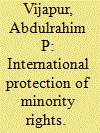

|
|
|
| 15 |
ID:
081860
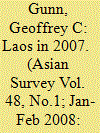

|
|
|
|
|
| Publication |
2008.
|
| Summary/Abstract |
Laos in 2007 unveiled new infrastructure linking the landlocked country with its neighbors. Just as Laos seeks to exploit its ample natural riches, so the country reinvents its sense of regional integration. Willy-nilly, such late-arriving globalization also brings the still largely isolated communist state under increasing international attention on a range of governance and human rights issues
|
|
|
|
|
|
|
|
|
|
|
|
|
|
|
|
| 16 |
ID:
178864
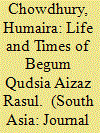

|
|
|
|
|
| Summary/Abstract |
This paper examines the life and times of a remarkable twentieth-century figure, Begum Qudsia Aizaz Rasul (1908–2001), the first and only Muslim woman in independent India’s Constituent Assembly which drafted the country’s Constitution. In doing so, it critically engages with the genre of autobiographical writing—the limits it imposed and the particular vantage points it offered. By drawing upon Begum Rasul’s private papers, her autobiography and her speeches in the Constituent Assembly debates from 1946 to 1950, this paper unpacks the ways in which she sought to negotiate her multiple and intersecting identities of class, gender and religious background. Her acts of self-fashioning provide critical insights into how Muslim women negotiated their identities in post-colonial India often in resistance to, and conformity with, the national status quo.
|
|
|
|
|
|
|
|
|
|
|
|
|
|
|
|
| 17 |
ID:
159745
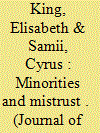

|
|
|
|
|
| Summary/Abstract |
An enduring debate in the conflict management literature concerns the wisdom of recognizing versus avoiding reference to ethnic identities in institutions to manage ethnic conflict. Understanding why ethnic recognition occurs is crucial for informing this debate. We develop a theory based on functional and political mobilization effects of recognizing ethnic groups. Contrary to reasoning that minority leaders would be most interested in recognition, the theory suggests that recognition consistently favors the interests of leaders from larger, plurality groups, whereas minority leaders face a ‘dilemma of recognition’ between functional gains and mobilization threats. We use mixed methods to test our theory. For our quantitative analysis, we draw on an original coding of recognition in constitutions and comprehensive political settlements from 1990 to 2012. We find that for cases with leaders from plurality groups, recognition is adopted 60% of the time. With leaders from minority groups, the rate is about 40 percentage points lower, even after accounting for many background factors. Additional quantitative tests and a qualitative analysis present more detailed evidence to show that the processes correspond to the logic of our theory. Answering these questions about when and why recognition is adopted is a crucial step in evaluating its effects on conflict.
|
|
|
|
|
|
|
|
|
|
|
|
|
|
|
|
| 18 |
ID:
086145
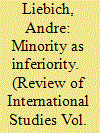

|
|
|
|
|
| Publication |
2008.
|
| Summary/Abstract |
This article argues that minority rights developed as an indemnity offered to defeated parties. As a grudging and begrudged calculus of compensation, considered inadequate by the vanquished and offensive by the victors, minority rights have been unable to compete in terms of legitimacy with either an increasingly robust international human rights regime or with the right of national self-determination. After reviewing some explanations for the weakness of the existing minority rights regime, this article traces the rationale of what may be described anachronistically as minority rights provisions in international treaties from the Peace of Westphalia to the Versailles settlement, concluding with a consideration of present-day implications of the argument elaborated here.
|
|
|
|
|
|
|
|
|
|
|
|
|
|
|
|
| 19 |
ID:
152334
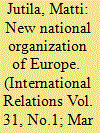

|
|
|
|
|
| Summary/Abstract |
Post–Cold War Europe witnessed the resurgence of different forms of nationalism and also the re-establishment of a minority rights regime. At the surface level, rights of national minorities seem to undermine nationalism as a political organization principle, but on a closer investigation the relationship between the two is more complex. This article uses insights from the English school’s theorizing on primary and secondary institutions to investigate the relationship between the primary institution of nationalism and secondary institution of minority rights regime. After a brief discussion of nationalism as a primary institution and its influence on the implementation of universal human rights, this article presents a detailed study of the minority rights regime analysing how it challenges, transforms and reproduces nationalism as a primary institution of contemporary European society of states.
|
|
|
|
|
|
|
|
|
|
|
|
|
|
|
|
| 20 |
ID:
088415


|
|
|
|
|
| Publication |
2009.
|
| Summary/Abstract |
Does exposure to terrorism lead to hostility toward minorities? Drawing on theories from clinical and social psychology, we propose a stress-based model of political extremism in which psychological distress-which is largely overlooked in political scholarship-and threat perceptions mediate the relationship between exposure to terrorism and attitudes toward minorities. To test the model, a representative sample of 469 Israeli Jewish respondents was interviewed on three occasions at six-month intervals. Structural Equation Modeling indicated that exposure to terrorism predicted psychological distress (t1), which predicted perceived threat from Palestinian citizens of Israel (t2), which, in turn, predicted exclusionist attitudes toward Palestinian citizens of Israel (t3). These findings provide solid evidence and a mechanism for the hypothesis that terrorism introduces nondemocratic attitudes threatening minority rights. It suggests that psychological distress plays an important role in political decision making and should be incorporated in models drawing upon political psychology.
|
|
|
|
|
|
|
|
|
|
|
|
|
|
|
|
|
|
|
|
|